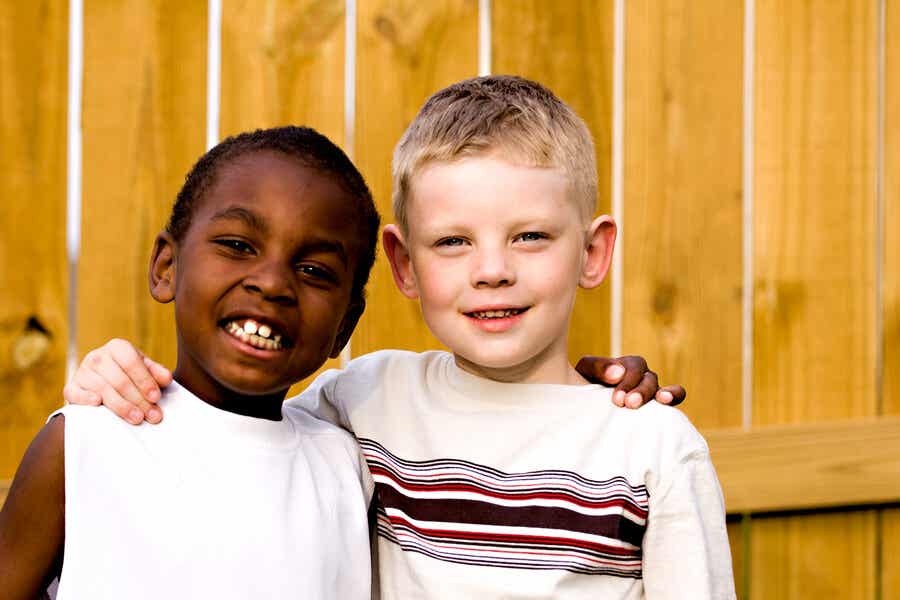Tips for Raising Bilingual Children

Sometimes it can be complex to raise bilingual children, mainly because adapting to two languages often takes time and can even slow down the child’s speech process. But, this is only a small negative point that’ll quickly lead to great advantages in the long run for the child, both socially and professionally. Because they’ll have the ability to speak two languages in the future. The following tips will guide you in applying various strategies:
Some tips for raising bilingual children
The process of raising bilingual children tends to be a bit more complex because, many times, one language must be worked on at home while, at school, the focus is on learning the other language. There are many strategies that you can apply, but these are the most important ones:
- Use of tools. Nowadays, technology has become a very useful tool and there are many applications to learn about different languages. It’s always positive for parents to sit down with their children to use it together.
- Use bilingual books. Reading’s fundamental in this process in order to improve grammar. You can also read stories in the language they’re learning and explain the words.
- Multimedia content.
- Television can help you learn the language faster. There are many educational programs that teach each of the words, and this can accelerate their learning.
- When a child watches a movie, it should be in the language you want them to learn. This way, when listening, they’ll listen and establish associations with what they see on the screen.
- It’s not only good to show them animated movies, but also educational programs for children. It’s also a good idea to show them documentaries about the country where the target language is spoken. This helps children learn much more about the country and the language.
- Socialization. The child should socialize with friends who are fluent in the language. When the child interacts with their friends, they’ll do so in the language they’re learning.

The advantages of raising bilingual children
It’s important to remember that each child is special and develops their language over time, but it’s normal that when learning two languages, they’ll take a little longer to perfect each one. It’s very likely that the child will get confused and use words in both languages to put together a sentence, so parents must be patient as they mold their language. Among the many advantages of raising a bilingual child we find the following:
Health benefits
Believe it or not, being bilingual even offers health benefits. The capacity that the brain begins to acquire at the moment of connecting and disconnecting different languages creates a system prepared for change and errors, storing information in a very different way than a monolingual brain. This will make it easier for the child to learn other languages.
Economic benefits
When a child studies and develops in two languages, they have many more possibilities of acquiring a job, and could even have more work opportunities in other countries. Languages such as English, Spanish, and Chinese are essential nowadays, which means that the younger the child learns, the easier it’ll be to perfect it over time.
Educational benefits
A bilingual child will have a greater capacity to learn different languages more easily, which means that, if they want to start learning another language, they’ll have this advantage. Another important point is that the child will have the possibility of studying in a school or university in that language without any problem.

Social and cultural benefits
Nowadays, people from different countries can communicate with much more ease, mainly thanks to technology. Social relationships and the exchange of cultures have made it a necessity to speak several languages. Being bilingual increases social skills and decreases shyness.
Learning two languages increases a child’s ability to concentrate. In addition, it improves both short and long-term memory.
There are many more advantages to raising a bilingual child and it’s highly recommended. Although parents may feel a little fearful because their child may take a little longer to speak than others who speak only one language, this will be really beneficial for their future. The benefits will be seen over time, but it’ll be very helpful for them to develop much better in society.
Sometimes it can be complex to raise bilingual children, mainly because adapting to two languages often takes time and can even slow down the child’s speech process. But, this is only a small negative point that’ll quickly lead to great advantages in the long run for the child, both socially and professionally. Because they’ll have the ability to speak two languages in the future. The following tips will guide you in applying various strategies:
Some tips for raising bilingual children
The process of raising bilingual children tends to be a bit more complex because, many times, one language must be worked on at home while, at school, the focus is on learning the other language. There are many strategies that you can apply, but these are the most important ones:
- Use of tools. Nowadays, technology has become a very useful tool and there are many applications to learn about different languages. It’s always positive for parents to sit down with their children to use it together.
- Use bilingual books. Reading’s fundamental in this process in order to improve grammar. You can also read stories in the language they’re learning and explain the words.
- Multimedia content.
- Television can help you learn the language faster. There are many educational programs that teach each of the words, and this can accelerate their learning.
- When a child watches a movie, it should be in the language you want them to learn. This way, when listening, they’ll listen and establish associations with what they see on the screen.
- It’s not only good to show them animated movies, but also educational programs for children. It’s also a good idea to show them documentaries about the country where the target language is spoken. This helps children learn much more about the country and the language.
- Socialization. The child should socialize with friends who are fluent in the language. When the child interacts with their friends, they’ll do so in the language they’re learning.

The advantages of raising bilingual children
It’s important to remember that each child is special and develops their language over time, but it’s normal that when learning two languages, they’ll take a little longer to perfect each one. It’s very likely that the child will get confused and use words in both languages to put together a sentence, so parents must be patient as they mold their language. Among the many advantages of raising a bilingual child we find the following:
Health benefits
Believe it or not, being bilingual even offers health benefits. The capacity that the brain begins to acquire at the moment of connecting and disconnecting different languages creates a system prepared for change and errors, storing information in a very different way than a monolingual brain. This will make it easier for the child to learn other languages.
Economic benefits
When a child studies and develops in two languages, they have many more possibilities of acquiring a job, and could even have more work opportunities in other countries. Languages such as English, Spanish, and Chinese are essential nowadays, which means that the younger the child learns, the easier it’ll be to perfect it over time.
Educational benefits
A bilingual child will have a greater capacity to learn different languages more easily, which means that, if they want to start learning another language, they’ll have this advantage. Another important point is that the child will have the possibility of studying in a school or university in that language without any problem.

Social and cultural benefits
Nowadays, people from different countries can communicate with much more ease, mainly thanks to technology. Social relationships and the exchange of cultures have made it a necessity to speak several languages. Being bilingual increases social skills and decreases shyness.
Learning two languages increases a child’s ability to concentrate. In addition, it improves both short and long-term memory.
There are many more advantages to raising a bilingual child and it’s highly recommended. Although parents may feel a little fearful because their child may take a little longer to speak than others who speak only one language, this will be really beneficial for their future. The benefits will be seen over time, but it’ll be very helpful for them to develop much better in society.
All cited sources were thoroughly reviewed by our team to ensure their quality, reliability, currency, and validity. The bibliography of this article was considered reliable and of academic or scientific accuracy.
- Fishman, J. A. (1976). Bilingual Education: An International Sociological Perspective. https://eric.ed.gov/?id=ED144354
- May, S., Hill, R., & Tiakiwai, S. (2004). Bilingual/immersion education: Indicators of good practice. Final Report to the Ministry of Education, New. http://www.kns.ac.nz/files/6d9cf62d1d8e8824/file_set_file/0000/0532/May,%20Hill,%20Tiakiwai%20(2004)%20Education%20Counts.pdf
- Krashen, S. D. (2001). Bilingual education: Arguments for and (bogus) arguments against. GEORGETOWN UNIVERSITY ROUND TABLE ON LANGUAGES AND LINGUISTICS 1999, 111.
- Krashen, S. (1998). Bilingual Education: Good for English. NCJW Journal, 21(3), 18. https://search.proquest.com/openview/f8a733228b15daea9b1ab0d32cb6b4a7/1?pq-origsite=gscholar&cbl=27059
- Verma, M. K., Corrigan, K. P., & Firth, S. (Eds.). (1995). Working with bilingual children: good practice in the primary classroom(Vol. 6). Multilingual matters.
This text is provided for informational purposes only and does not replace consultation with a professional. If in doubt, consult your specialist.








